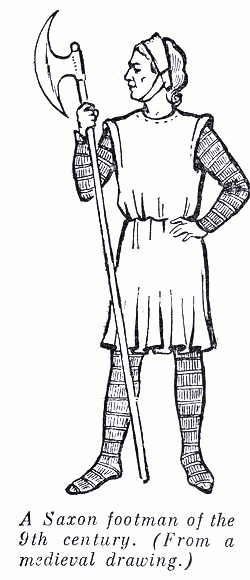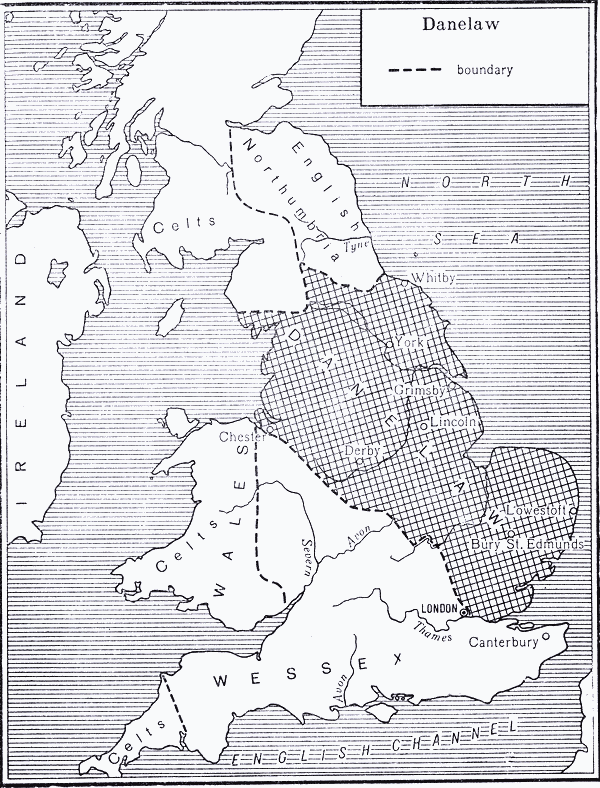Strengthening of the Kingdom in the Reign of Alfred the Great (871-899)
Category: 09th centuryIn 871 the Danes invaded Wessex again. But it was not so easy to devastate Wessex as other parts of England. Wessex had united the small Anglo-Saxon kingdoms and under the reign of Egbert’s grandson, King Alfred (871-899) who became known in English history as Alfred the Great, Wessex became the centre of resistance against the invaders.
 Alfred managed to raise an army and to stop the offensive of the Danes. He made new rules for the army, in which every free man had to serve and to come provided with the proper weapons. A levy of infantrymen made up of free peasants and an army of knights consisting of landlords were formed. The landlords were ordered to come with good armour and on horseback. Only half of the infantrymen of the shire served in the army at a time. The others were occupied with their work at home and when it was their turn to serve, they became warriors. Thus all the free peasants of Wessex were trained to fight and Alfred could raise a large levy of infantrymen when it was necessary. The army of horsemen was increased too. Alfred granted much land to his warriors and in this way the number of fighting men who were bound to do military service in return for their estates grew considerably.
Alfred managed to raise an army and to stop the offensive of the Danes. He made new rules for the army, in which every free man had to serve and to come provided with the proper weapons. A levy of infantrymen made up of free peasants and an army of knights consisting of landlords were formed. The landlords were ordered to come with good armour and on horseback. Only half of the infantrymen of the shire served in the army at a time. The others were occupied with their work at home and when it was their turn to serve, they became warriors. Thus all the free peasants of Wessex were trained to fight and Alfred could raise a large levy of infantrymen when it was necessary. The army of horsemen was increased too. Alfred granted much land to his warriors and in this way the number of fighting men who were bound to do military service in return for their estates grew considerably.
During the reign of Alfred the Great the first British Navy was built and a war fleet of ships larger and faster than those of the Danes protected the island. Besides, many places which could be easily attacked by the enemy were fortified. Earthen walls were built around them. These walls, or forts, were protected by fighting men who owned land in the neighbourhood.
As a result of all these measures, the Anglo-Saxons won several victories over the Danes. In the treaty which followed in 886, the Danes promised to leave Wessex and a part of Mercia. They settled in the north-eastern part of England, a region which was from that time called the Danelaw, because it was ruled according to the law of the Danes. The great Roman road, Watling Street, was the boundary that separated the Danelaw from Wessex. Thus the Danes were prevented from conquering the whole island and the country was divided into two parts: the Danelaw (Northumbria, East Anglia and a part of Mercia), where the Danes spoke their language and kept to their way of life, and the English south-western part of the country, that is, Wessex, which was under Alfred’s rule. At the end of the 9th century new Danish attacks were made, but they were beaten off; the Anglo-Saxons won their first victories on the sea, and soon the Danes no longer dared to attack Wessex.
In time of peace Alfred the Great took measures to improve the laws in the interests of the great landowners and to raise the standard of culture among them. King Alfred knew not only how to write and read — an uncommon thing even for princes in those days—but he was well versed in Greek and Latin. He read a good deal and he realized how backward the Anglo-Saxons were compared with the people of France and Italy, and even more so as compared with the Romans five hundred years earlier. The Anglo-Saxons, whose ancestors had destroyed the Roman civilization in Britain four centuries before, could build nothing better than rough timber dwellings, and wore nothing finer than coarse homespuns. Few, even among the clergy, could read and write and even at Canterbury there were not enough priests to conduct the services in the cathedral.
The king sent for artisans, builders and scholars from the Continent. The monasteries and churches which had been burnt by the Danes were rebuilt and schools were set up in the monasteries for the clergy.
 Alfred demanded that all the priests should learn Latin, as the Bible and service-books were all in that language, and it was the duty of the clergy to understand them. He also ordered all future state officials to learn the Latin language as well. Here is what a contemporary wrote about how Alfred corrected incompetent judges: “If Alfred found something wrong in the judgements, he would ask those judges… why they had judged so unjustly, whether through ignorance or for the love or fear of any one, the hatred of another, or the desire of some one’s money. If the judges acknowledged they had given such judgement because they knew no better, he reproved their inexperience and folly in such terms as these:
Alfred demanded that all the priests should learn Latin, as the Bible and service-books were all in that language, and it was the duty of the clergy to understand them. He also ordered all future state officials to learn the Latin language as well. Here is what a contemporary wrote about how Alfred corrected incompetent judges: “If Alfred found something wrong in the judgements, he would ask those judges… why they had judged so unjustly, whether through ignorance or for the love or fear of any one, the hatred of another, or the desire of some one’s money. If the judges acknowledged they had given such judgement because they knew no better, he reproved their inexperience and folly in such terms as these:
‘I greatly wonder at your assurance, that whereas, by God’s favour and mine, you have taken upon you the rank and office of the wise, you have neglected the studies and labours of the wise. Either, therefore, at once give up the administration which you possess or do your best to study the lessons of wisdom. Such are my commands.’ At these words all his sheriffs and officers would be filled with terror at being thus severely corrected, and they gave themselves up to the study of letters, choosing rather to acquire an unfamiliar discipline than to resign their functions.”
A school was started in the palace itself where the sons of the nobles learned to read and write. Alfred himself sometimes taught there. As nearly all the books of that time were written in Latin, and few people could read them, translations of some Latin books into Anglo-Saxon were made. Books on religion, history and philosophy were translated so that those people who learned to read could understand them in their own tongue.
“If any official,” the contemporary continued, “because of his old age or untrained mind, was unable to make progress in studies, he would order his son, if he had one, or one of his relations to read Saxon books before him night and day. They counted happy the youth of the present day, who could be so well instructed, while they had neither learned these things in their youth, nor now were able to do so ” Some books were translated from Latin by King Alfred himself. Among others, he translated Ecclesiastical History of the English People which the Venerable Bede had written in Latin. The hand-written books were copied out many times in monasteries. At that time many Latin words came into Anglo-Saxon. The words spade, mill as well as names of building materials, such as tile, mortar, marble, chalk were adopted from Latin.
The books which were translated from Latin taught men mainly about the history and geography of the Continent. Alfred ordered that the learned men should begin to write a history of England. In several monasteries the learned monks collected together all that was known of the early history of the country and began to keep a record of the outstanding events of each year. Thus was written a history of England called the Anglo-Saxon Chronicle which was continued for 250 years after the death of Alfred. It is mainly from the Anglo-Saxon Chronicle that the books of today get their information of the events of English medieval history. The Anglo-Saxon Chronicle is on view now at the British Museum. Only scholars who have studied the Anglo-Saxon language in which it was written can understand it and translate it into Modern English.
King Alfred also ordered that the old customs and laws followed by the Anglo-Saxons before him in Wessex and Mercia should be collected. New laws were added to the collection, and a Code of English Law was drawn up. Everybody had to follow the laws of the kingdom. In the reign of Alfred the Great the power of the royal officials strengthened greatly. The whole country was divided into shires and hundreds as before and through his officials King Alfred held all parts of the country under strict control.
Alfred’s policy was pursued for the benefit of the big landowners. The king and the class of the landowners he represented needed both a literate clergy to talk the poor into being obedient and literate officials who could rule the feudal state. In the reign of Alfred the Great, the kingdom of England became stronger and it helped the big landowners to defend their property against the invaders and to keep the exploited in obedience.
Documents. Alfred’s Statement Concerning His Laws
After … many nations had accepted the faith of Christ, many synods assembled throughout the world. Such there were throughout England, consisting of bishops and other competent councillors.
Christ ordained that one should love one’s lord as himself. Accordingly in many synods they prescribed fines for many human misdeeds, and in many synodical records they wrote here one punishment, and there another. I, then, King Alfred, gathered these laws together, and commanded many of those which our forefathers held and which seemed good to me, to be written down, and many of those which did not seem good to me I rejected and commanded that they be kept in another manner.
I, then, Alfred, King of the West Saxons, showed all these to my councillors, and they said that it seemed good to them all.
